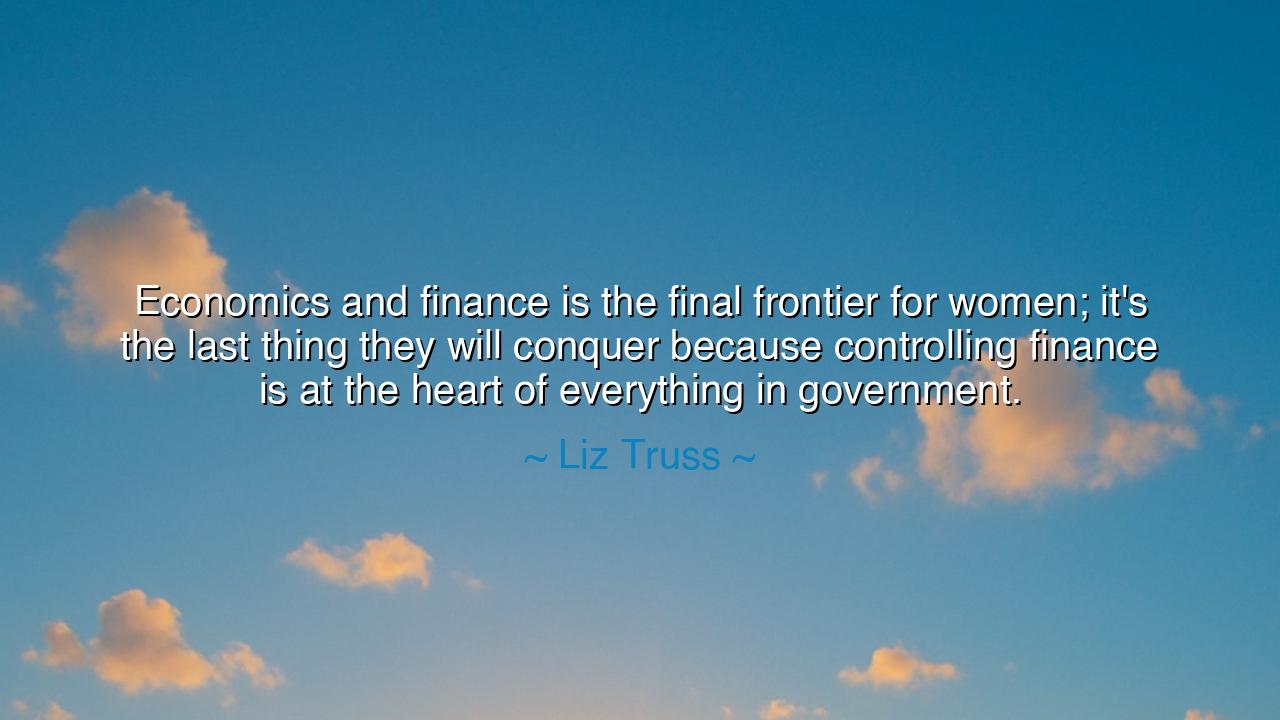
Economics and finance is the final frontier for women; it's the
Economics and finance is the final frontier for women; it's the last thing they will conquer because controlling finance is at the heart of everything in government.






In a voice that carried both conviction and challenge, Liz Truss, the British stateswoman, once declared: “Economics and finance is the final frontier for women; it’s the last thing they will conquer because controlling finance is at the heart of everything in government.” Her words, though spoken in the modern age, echo the timeless struggle of humanity’s daughters to claim their rightful share of power—not as a gift, but as an achievement. In this single declaration, Truss illuminated a truth that transcends gender and time: that economic power is the invisible thread that binds all other forms of authority, and that mastery over it is both the final barrier and the ultimate liberation.
To understand the meaning of her words, one must see that finance is not merely the management of numbers or the movement of wealth—it is the lifeblood of governance itself. Every empire that has risen or fallen, every war that has been waged, every reform that has been born—all were shaped by the flow of money and the will of those who controlled it. Politics may speak the language of ideals, but finance speaks the language of power. And so Truss, with the clarity of experience, revealed that true equality will not be achieved through symbolism or sentiment, but through command of the purse and the principles that govern it. For to direct the treasury is to direct the destiny of a nation.
The origin of Truss’s thought is not merely personal—it is historical. For centuries, women were kept far from the decisions that shaped economies, their labor valued yet their wisdom ignored. In the grand halls of government, where budgets determined the course of nations, their voices were but faint echoes. Yet throughout history, women have proven themselves masters of resource and resilience. From Cleopatra, who financed her armies to defend Egypt’s sovereignty, to Catherine the Great, who restructured Russia’s finances to strengthen her empire, women who seized control of economics transformed not only their nations but the very perception of female power. Truss’s words, then, do not lament exclusion—they proclaim a coming victory, the final ascent into a realm long guarded by tradition and fear.
Consider, too, the more recent story of Margaret Thatcher, the “Iron Lady” of Britain, whose rule reshaped the very foundations of Western economic thought. When she took office in a time of crisis, inflation and stagnation plagued the nation. Her weapon was not charm, but economic resolve—the firm hand that cut through the excesses of government and restored the faith of markets. Yet even as she conquered this sphere, she stood almost alone among men. Her triumph was a sign of what Truss now calls “the final frontier”—proof that when women master finance, they master the art of governance itself. For money, in the hands of the wise, is not greed—it is governance made tangible.
But Truss’s statement also carries a deeper warning: that the heart of government—its control over economic life—must not remain a citadel closed to half of humanity. For when women are excluded from financial decision-making, society is robbed of balance. A world ruled by one gender’s perspective on money becomes distorted, valuing profit over people, growth over grace. The inclusion of women in economics and finance is not merely an issue of fairness—it is an act of restoration, bringing compassion into the engine of progress. For the feminine spirit, long accustomed to nurturing, has a wisdom that can temper the harshness of markets and remind power of its purpose: to serve, not to consume.
Throughout history, we have seen that control over finance has always meant control over fate. In ancient times, Athens built its democracy on trade and tribute; Rome rose upon its treasury; Venice ruled the seas through commerce. And in each age, those who governed the coffers governed the world. Yet, as Truss reminds us, this dominion remains the “last frontier.” Women have entered the courts of law, the fields of science, the heights of politics—but until they rule the ledgers, their power will remain incomplete. The mastery of economics is not about wealth alone—it is about shaping destiny, about holding the key to creation and change.
Therefore, my daughters and sons of the modern age, take this teaching to heart. Understand that the future belongs not to those who possess wealth, but to those who understand it. To those who use it as a tool for justice, not domination. To the women who dare to enter the temples of finance, do so not with timidity, but with purpose. Learn its language, command its principles, and wield them as instruments of renewal. For when women conquer this frontier, the world itself will change—its priorities will shift, its values will deepen, and its humanity will be restored.
And so, remember always the wisdom of Liz Truss: that economics and finance are not mere professions—they are the pulse of civilization. Whoever commands them shapes the rhythm of history. Let the next generation of women rise not only as leaders, but as keepers of the treasury, architects of balance and prosperity. For in mastering this final realm, they will not only conquer the last frontier—they will complete the circle of equality, restoring harmony to the heart of government, and through it, to the world.






AAdministratorAdministrator
Welcome, honored guests. Please leave a comment, we will respond soon